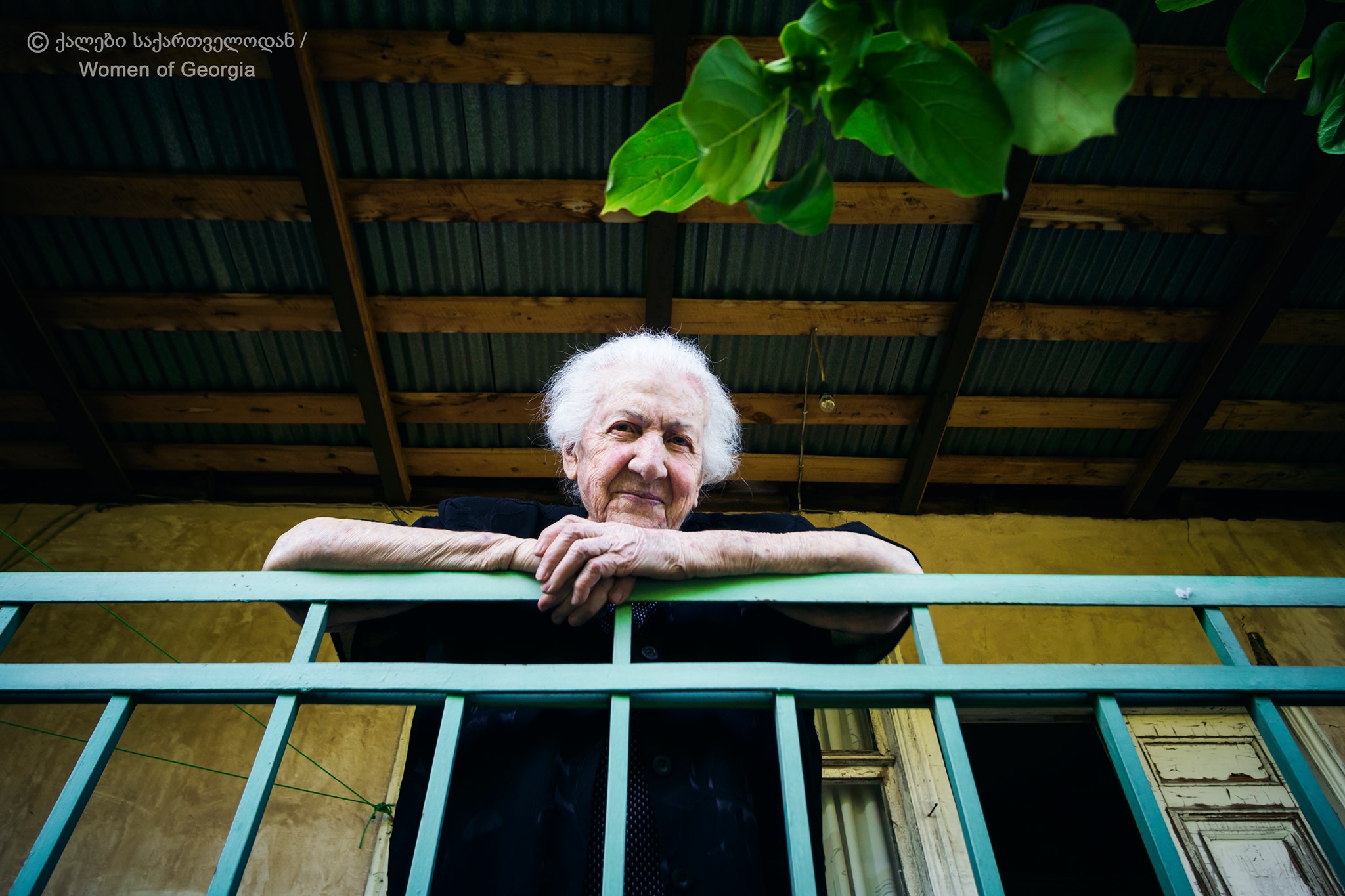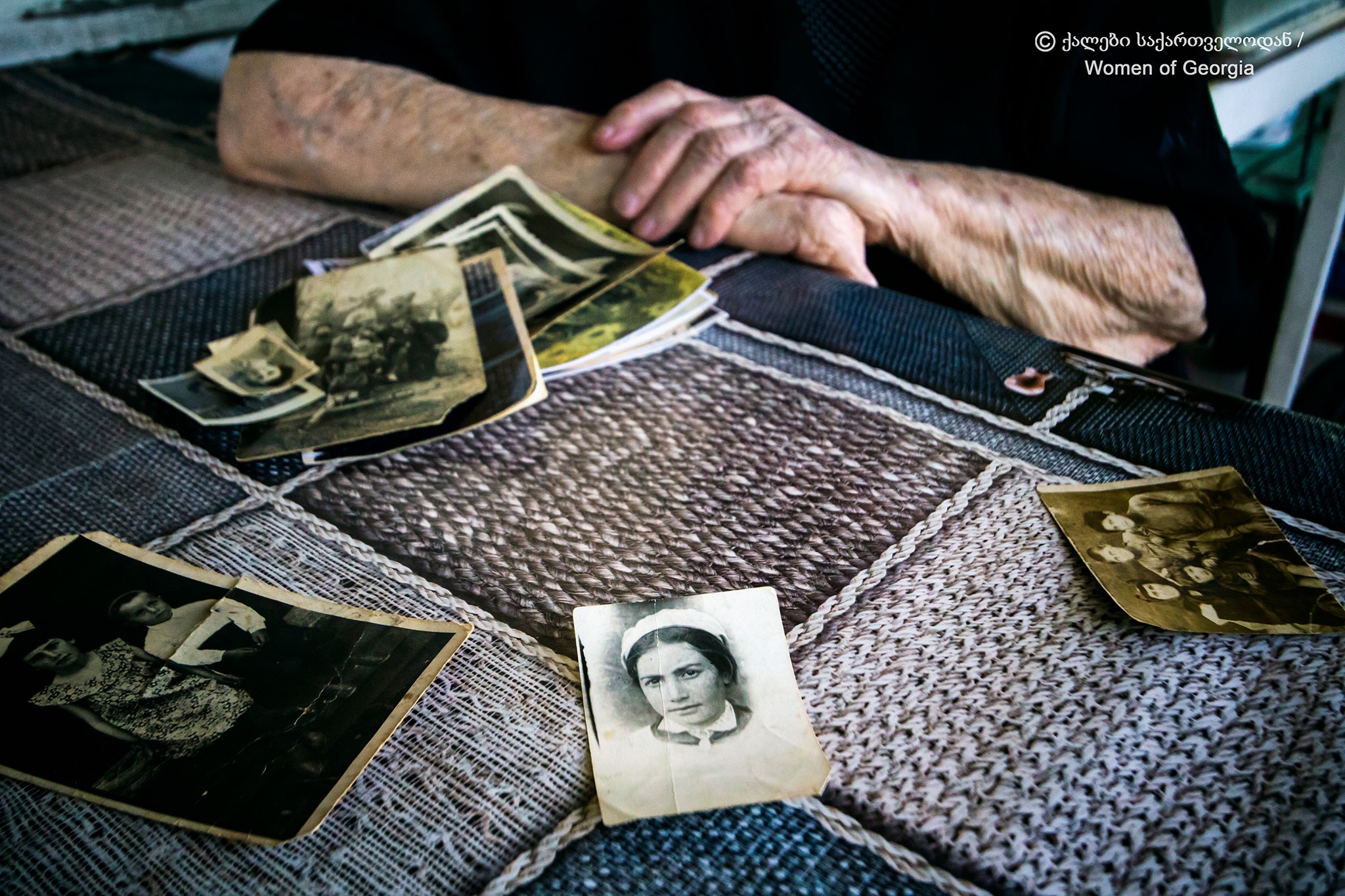Asmat Petriashvili, 92 years old, Tbilisi
The Pandemic
I remember nothing like this in my whole life. We were scared, but we were careful, did everything we were told and taught: we didn’t go outside, or anywhere, for that matter; we stocked up on so much pasta and rice that it will probably last until next year. I know from my ancestors how people died from the black plague in my hometown, in the village Pkhvenisi, in Gori district. A very good young man died there when he was 26 years old. It was a long time ago, but we still have a picture of him hanging on the wall. He was a lovely person, the only son in their family. When her brother died, that woman couldn’t stand being alone and adopted my mother. She cried such burning tears that her skin was damaged for months. She couldn’t stand loneliness anymore, so she adopted my mother and raised her. My mother fell in love with my father and got married right there, in the same village.
Father
I was a cheerful child until I was 10 years old. My father was deported in 1937 when he was 33 years old. My father was the chairman of the collective farm, and the charges brought against him were silly and embarrassing. They appreciated him in the entire district. At the meetings, where the district heads were also present, they used to say – ‘’take an example from Ilo Petriashvili!’’. Some time passed and Ilo Petriashvili turned out to be a pest and an enemy of the people. He had a lot of enemies. Some liked his bravery; My father was a great man. He was not beautiful, but he was lovely to look at. He was deported to Sverdlovsk. It turns out that he was acquitted when he was still on the road, but they didn’t return him. It was a dark time for everyone, especially for prisoners. After so many days and months they arrived in Sverdlovsk, in the Ural Mountains. Then they took him to Solikamsk and he was forced to work in the mines cut down trees. My mother sent parcels every day. She would definitely send lard that she made herself, slice it, and put it in a package. She would also cut a soap bar in half, put money in it, and put the other half back on. Sending money was prohibited, the prisoner would be punished and we wouldn’t be allowed to send anything again.
My mother went from lawyer to lawyer about my father’s issue. There was one man – Chikvanaia, a republic-level prosecutor, and my mother was waiting by his door all the time. Sometimes they didn’t let her in, sometimes they denied her requests. When my father was taken away and the policeman told him to say goodbye to his family, he kissed the children first, then hugged my mother and said, that he was innocent and would be back soon. My mother told him, that she was not afraid, that she would put on iron shoes, hold an iron stick, and prove his truth anyway. She did – she put on iron shoes and took the iron stick; she was at Chikvanaia’s door all the time, but no one took mercy on my father. The war had already started when my father wrote to us that three of them sneaked out from the camp. He said they found a boat on the water and that they went to the shore, but some little boys saw them, called the police and they were brought back. They wanted to go to the war front and prove that they were not enemies to anyone.
There’s a neighboring village, Dzevera. The wife of a man from there informed us that she received a letter and asked us to come and read it. The river Liakhvi flows between us and that village. My mother and grandma had to step through it. The river has strong waves that neither my mother nor my aunt could cross. We had one strong relative, and he first took my mother, and then my aunt, over the river. The woman didn’t let my mom read the whole letter, only these two sentences – ‘’When Ilo Petriashvili was with me, a tree fell on him and he died.’’ They got the most horrible news. They cried their tears out… It destroyed my mother. The whole village came to mourn; only his enemies didn’t come. My father was a tough man. That was the reason he accomplished so much; if you don’t tighten up, you can’t be a leader. The peasants didn’t like it. They thought that members of the collective were chosen by Ilo Petriashvili. Even people who were considered educated at the time didn’t understand what was happening and made enemies with them. There was one chemistry teacher at school and I thought to myself if these people couldn’t understand what this collectivization was, or who created this collective if this man couldn’t understand it, why did he study for so long?! I mean the peasants – there were few really educated people.
 During Beria’s time, the acquittal for my father was approved and I received 7 Manats. My father was already dead. When I saw it, the justification, I was very sad. As if he died one more time. They acquitted the man who did nothing wrong. He held anti-state, Trotskyist meetings in his home, they said. I was little back then, but not that little that I wouldn’t see strangers coming to our house. Now, I would be able to say it openly, but it really wasn’t the case.
During Beria’s time, the acquittal for my father was approved and I received 7 Manats. My father was already dead. When I saw it, the justification, I was very sad. As if he died one more time. They acquitted the man who did nothing wrong. He held anti-state, Trotskyist meetings in his home, they said. I was little back then, but not that little that I wouldn’t see strangers coming to our house. Now, I would be able to say it openly, but it really wasn’t the case.
‘’The daughter of the Enemy’’
When my father was deported, had only my mother. We were 2 small children and an elderly – the sister of my grandfather, in whose house we still live today. We didn’t grow up happy. I was 10 years old, my brother was 5 or 6 and my sister was still a baby. We had land, but the land needs to be cultivated. If you don’t work, what would a land give to you?! My mother was a very smart woman, who, as they say, would squeeze the juice out of a stone, and she did everything she could. She was a gifted woman, she could sew and she sew us clothes. Once she sewed a dress for me, with different material on the front, the back was different, the ‘’coquette’’ was different and I was colorful as a bird. Not because it was in the trend, but because that’s all we had.
We had a grandfather – the father of our mother. He was in poor health but still offered my mother to move with him. But my mother rejected, she said, she wouldn’t leave Ilo’s home and she was ready for whatever would come. There was one man, Gogia Ghonghadze. My father did nothing wrong to him, we even had a good relationship before, but this man was a bit aggressive. My father was exiled for two years already. My aunt lived with us and studied outside in the front room. She had a table and a lamp there. She was just about to bring the lamp inside to lie down and boom! Something hit the room and fell on the table, where aunt Ano was sitting. My aunt jumped up at that moment, turned on the lamp, and saw a big stone on the table. She took the stone, ran out into the yard, and saw someone walking upstairs. At the top of the street, there was a club, an office, and other places, and she followed that men in the darkness. She asked men sitting there, who was the one that just entered. They told her who it was. My aunt went on the stage at the club, there were a lot of people including the chairman, the brigadiers, and some others sitting, the peasants – down on the chairs. She told them that Gogi Ghonghadze came and threw this stone at her and that she followed him to that place. Unfortunately, nobody cared about the story. There weren’t any charges neither against Gogia nor to anyone else. We were lucky enough, that the stone didn’t kill my aunt.
My brother is sometimes telling a story – we had the same math teacher at school, but he never insulted me like that. He used to put my brother in front of the children and draw on his face with the chalk; he said to children, that my brother was the son of an enemy. And my brother cried… Even now, when I think about it, I have to cry.
The War
I was in 7th grade when the war started. It was a tough time for us. They sent all of our harvests to the front and we had nothing left. But we found a solution – I was already 11-13 years old, my brother was a little older and my sister was 5. So, we collected wheat heads. We would collect a few bags and they gave us 300-400 grams from there. We planted corn and somehow, we were able to survive.
When the war ended, I was already an adult; I finished school. My mother and I were in the vineyard, we were planting corn. Suddenly my brother looked at the garden and said – ‘’Mother! Asmat! The war is over!’’. When we heard that, we threw our hooves away and ran so fast, that we left Koba behind. The yard of our club was full of people. I ran to the office and there was one of my friends – Marekhi Patarashvili. I congratulated her and hugged her like crazy. Everybody was asking, where Rezo was – the chairman of the collective farm. People said he should be in the field. I told Marekh, to come with me and make Rezo happy about the news. We ran so much, we couldn’t even breathe. “The war is over! The war is over! ” Rezo was shaking us both from joy. He said there was a bull in the brigade and it should be slaughtered for the occasion. The bull was slaughtered and the whole village celebrated that day.
Student
I was a student in Gori. None of our relatives helped me and I didn’t have anywhere to stay. So, my student life wasn’t easy at all. I stayed with one relative for one or two weeks, then they had trouble in the family and I had to move out, I spent two years like that. If I were standing in the line for bread in the evening, I would either get bread in the morning or not. The bread was made of corn, broom seeds, soybeans, and some messy things inside. They looked like bricks. It was hard to get even this kind of bread. My meal was one piece of cookie and Margarine. I would put it on the cookie like it was butter and it was my dinner, supper, and breakfast too. I didn’t have any clothes. My mother sewed one for me and I spent all my student days, winter, and summer in it. It was red, with white cops. We had a lecturer, we called him “Uncle Gabo”, he told us when he came to the first lecture, not to call him with an official name, just uncle Gabo. He was calling me ‘‘Ossetian Bride’’, since I was always wearing a red dress. I only had this one dress.

The Family
I met my husband in the village Nadarbazevi where I was sent as a teacher. I taught elementary school and there were so few children, that two classes sat together in class. My husband was from this village, they were 4 brothers. They have emigrated from Kakheti. How I met my husband? I greeted him, he greeted me back, once, twice…
Then we moved to Tbilisi. We left the village, because of its poorness. It was not profitable at all. They only cultivated wheat, no apples, no plums, they lived on a desolate field. In the 90’s we went back to the village again, we built a house, the farm gave us a plot of land and we planted bread, wheat, barley, and corn. We had bees, cows, we had three cows. My children didn’t feel the 90s.
Overall, we were short on money but we were very happy. No one heard loud words coming from our family. That I could live without him, it’s only because of my children.
The happiest moment was when my daughter enrolled at the university. Arranging for the Law faculty was so difficult back then. When they were announcing the results, she wasn’t given a day-off at work so I went to find out the results – how could I stay at home?! When I was coming back home, I was so happy, that I wanted every passer-by to ask me, what my child has done. Of course, nobody cared who I was or what my daughter did. It was nonsense, but that’s what I wanted. I was so happy, that I thought I was the tallest and thought, that I was looking at everybody from above.
The story of my father is the most emotional for me. Even now, I cry. I loved him very much, I couldn’t watch him enough. I can’t help but cry when I tell the story of my father.
Author: Nino Gamisonia
Photo: Nino Baidauri
Translation: Mariam Kajrishvili

